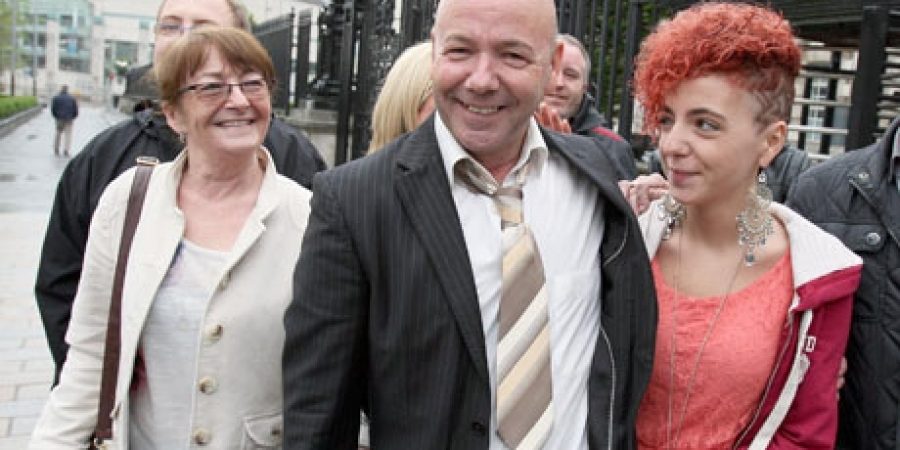21st June 2012;
The last man to receive the death penalty in the UK in 1973 had a conviction for murder quashed at the Northern Ireland Court of Criminal Appeal on the 21st June 2013. Liam Holden, originally from the Whiterock area of Belfast, was convicted of the murder of a British soldier in September 1972 after a jury trial in April 1973 during which the prosecution relied solely upon alleged confession evidence.
Mr Holden was arrested in October 1972 in respect of the murder of Private Frank Bell who was shot while on patrol in the Ballymurphy area of Belfast in September 1972. At the time of his trial in 1973 Liam Holden gave evidence that he was arrested by members of the Parachute Regiment who subjected him to torture in order to coerce a false confession before transferring him to the RUC. Mr Holden contended that the torture, involving mental and physical ill treatment, included what is now described as water torture, and the threat of death at gunpoint. The trial ran in Belfast in April 1973 before a jury. Mr Holden gave evidence both at the voir dire application to exclude the alleged confession evidence and at the trial hearing. Alibi evidence was provided by the defence. Despite the prosecution reliance on the alleged confession evidence only and the provision of both alibi evidence and evidence by Mr Holden, the jury in Northern Ireland in 1973 convicted him. The trial judge sentenced Mr Holden to death “in the manner prescribed by the law” . In 1974 the death penalty was commuted to a life sentence. Liam Holden subsequently served 17 years in custody.
Patricia Coyle, solicitor with Harte Coyle Collins, Solicitors & Solicitor Advocates, initially submitted an application to the Criminal Cases Review Commission in 2003 on behalf of Mr Holden on the basis that the conviction was unsafe. The case was referred back to the Northern Ireland Court of Criminal Appeal in 2009 on the basis that the conviction was unsafe. The reference to the Court of Appeal by the CCRC was made on a ‘blind’ referral basis, i.e. the reasons for the referral was contained in documents in a Confidential Annex/dossier which was provided by the CCRC to the Court of Appeal and shared with the Prosecution but not provided to the defence team for Mr Holden.
From 2009 to 2013 the defence made several applications to the court for disclosure of the contents of the Confidential Annex. The majority of the contents of the Annex/dossier were disclosed to the defence over the following 3 year period. These documents were historical secret military documents including in particular the “Blue Card Rules” which undermined the legality of Mr Holden’s original arrest and subsequent detention by the military in 1972. Despite the disclosure of these documents to the defence the Public Prosecution Service indicated their intention to continue to oppose the appeal.
In preparation for the appeal the defence also sourced and commissioned an expert witness, Mr Ian Cobain, to provide opinion on the historical use of water torture by the British military. Ian Cobain, a staff journalist with The Guardian newspaper, is a recipient of the Paul Foot Award for journalism for his ground breaking work on torture in Basra. Expert evidence from Mr Cobain was submitted by HCC Lawyers to the Northern Ireland Court of Criminal Appeal in March 2013.
On the 4th May 2013 the PPS indicated to the Court of Appeal that they were withdrawing their opposition to Mr Holden’s appeal and intended to offer no evidence at the appeal hearing. On the 21st June 2013 the appeal hearing ran on an uncontested basis before the Court of Appeal resulting in the Court quashing the 1973 conviction.
At the appeal hearing on the 21st June the defence sought the permission of the Court to circulate the historicial documents released from the Confidential Annex on the basis that they might assist other cases involving civilians unlawfully detained by the military in Northern Ireland in the early 1970s. The Ministry of Defence appeared at the appeal hearing and objected to the publication and distribution of these documents. Patricia Coyle indicated her intention to defend the firm’s application for publication and distribution. A date was fixed for hearing on the issue for September 2013. In September 2013 the MOD withdrew the objection to the publication and distribution of the historical documents. Harte Coyle Collins, Solicitors & Solicitor Advocates subsequently circulated the Blue Card Rules and other materials via the Solicitors’ Criminal Bar Association for Northern Ireland.






